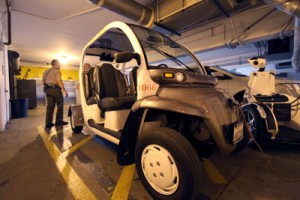University will regulate electric carts on campus
Bicyclists aren’t the only ones facing increased restrictions on campus roads.
At the same time as the Department of Public Safety is planning to deploy more electric carts, the university is working to enforce rules to help decrease traffic decongestion.

It’s electric · The first step to decongesting the traffic on campus is to have all vehicles register through their departments by the end of the year. - Carlo Acenas | Daily Trojan
The Environmental Health and Safety department of Career and Protective Services is currently working to create a safety program to train people in the proper use of electric vehicles, and Ed Becker, executive director of Environmental Health & Safety, said preliminary measures are being taken to draft an on-campus safety policy that will attempt to educate and spread awareness about the rules of operating an electric vehicle.
“It’s something that is already happening, and what we need to do is adapt the rules to make sure that we can control the growth in carts. It’s [about] controlling access and controlling the number of vehicles,” Becker said.
Becker said there need to be ways to ensure that electric cart drivers obey the rules of the road and to discourage the idea that drivers can behave differently just because they are on campus.
“Electric vehicles [are] a convenient way to get around but in order to have them coexist with all the other forms of transportation on campus, we have to have a clear set of rules and people following rules,” Becker said.
Another concern being addressed is how to prevent unregistered carts from coming onto campus, which has the potential to cause unwanted congestion or danger to those on campus.
Mandating that all the vehicles have some sort of USC registration will discourage these unregistered vehicles on campus because drivers will be able to be identified and found if need be, Becker said.
“The first step is having [the vehicles] first registered through a department, Becker said. “Not all of them are registered now, but by the end of the year, we’re hoping to have a full inventory.”
DPS Capt. David Carlisle said employing a strategy to decrease the number of DPS cars on campus and instead rely more heavily on alternative forms of transportation.
“The fewer the cars, the better; it’s more effective for DPS to patrol the University Park Campus on foot, on bikes or on our three-wheeled electrical vehicles called T3s,” Carlisle said.
DPS currently has a total of 47 bikes, 18 T3s, three electric carts and 30 vehicles available for patrol, said DPS Chief Carey Drayton.
Carlisle said the Ford Explorers that DPS officers drive are practical for police patrolling off campus. On campus, however, electrical vehicles could increase DPS accessibility.
“Using T3s, riding a bike or walking makes our officers more accessible to students, faculty and staff because it encourages one-on-one contact,” he said. “It’s easier for students, faculty and staff to talk to us [when not in cars] and we want everyone to know us on a personal basis since we are in a public safety partnership.”
Kim Hasday, a junior majoring in communication, said that a more alleviated campus will make it easier to transport back and forth to class.
“When I’m walking to campus, sometimes it’s so congested that I have to leave extra time to navigate through the crowd,” she said. “So, any way to ease this traffic, I’m all in favor of.”
